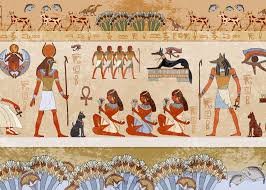
Egypt had numerous festivals dedicated to various gods.
"Communal gatherings for worship took place during festivals, and as the Egyptians set a premium on enjoying life, there were many of them throughout the year. These festivals (known as heb) allowed people to experience the god intimately, give thanks for gifts that were given, and make requests for divine favors."
https://www.worldhistory.org/article/10 ... ent-egypt/
The Egyptians observed national and local festivals annually. There were many such celebrations but those listed below are among the most important and best-documented.
Wepet-Renpet Festival: The Opening of the Year - This was the New Year's Day celebration in ancient Egypt.
Wag Festival: Dedicated to the death of Osiris and honoring the souls of the deceased on their journey in the afterlife.
Wag and Thoth Festival: A combining of the Wag Festival with the birth of the god Thoth and centered on rejuvenation and rebirth.
Tekh Festival: The Feast of Drunkenness: This festival was dedicated to Hathor ('The Lady of Drunkenness') and commemorated the time when humanity was saved from destruction by beer.
Opet Festival: One of the most important festivals in which the king was rejuvenated by the god Amun at Thebes.
Hathor Festival: Held annually at Dendera, the main site of Hathor's cult, this festival celebrated the birth of the goddess and her many blessings.
Sokar Festival/Festival of Khoiak: Sokar was an agricultural god in the Early Dynastic Period in Egypt (c. 3150 - c. 2613 BCE) whose characteristics were later taken on by Osiris.
Bast Festival: This was the celebration of the goddess Bastet at her cult center of Bubastis and another very popular festival.
Nehebkau Festival: Nehebkau was the god who bound the ka (soul) to the khat (body) at birth and then attached the ka to the ba (the traveling aspect of the soul) after death.
Min Festival: Min was the god of fertility, virility, and reproduction from the Predynastic Period in Egypt (c. 6000 - c. 3150 BCE) onwards. He is usually represented as a man standing with an erect penis holding a flail. The Min Festival was probably celebrated in some form starting in the Early Dynastic Period but is best attested to in the New Kingdom and afterwards.
Wadi Festival/The Beautiful Feast of the Valley: Similar in many ways to the Qingming Festival in China and the Day of the Dead in Mexico and elsewhere, the Beautiful Feast of the Valley honored the souls of the deceased and allowed for the living and dead to celebrate together while, at the same time, honoring Amun.
Sed Festival: Usually given as the Heb-Sed Festival, this celebration honored the king and revitalized him.
The Epagomenae: The Super-added Days. The Epagomenae were not festivals, although observances could be conducted and, no doubt, rituals were performed in temples, but still are counted among others because they formed the transition in the cycle of the year between the old and the new.
The Festival of Neith, for example, united the entire nation as people lighted candles and oil lamps at night to mirror the sky and bring earth into harmony with the realm of the gods.
The Festival of Ptah was one of the earliest, honoring the creator god.
The Raising of the Djed, dates from the Predynastic Period and is another of the earliest rites observed in Egypt which came to be associated with Osiris.
https://www.worldhistory.org/article/10 ... ent-egypt/
Even slaves were given days off to worship their gods.
"As a result of those numerous religious beliefs, ancient Egyptians paid enormous reverence and adulation to the gods. It was not just an important part of their lives, it was a matter of civic and moral duty for every Egyptian, regardless of economic or social class."
https://www.worldhistoryedu.com/importa ... ent-egypt/
So, it would not be out of place for Moses to ask for some holiday vacation for the Hebrew slaves.
Exod 5:1 (ESV)
Afterward Moses and Aaron went and said to Pharaoh, "Thus says the LORD, the God of Israel, 'Let my people go, that they may hold a feast to me in the wilderness.'"
But, since Yahweh was not on the approved list of Egyptian gods, Pharaoh would not allow it.
Exod 5:2 (ESV)
But Pharaoh said, "Who is the LORD, that I should obey his voice and let Israel go? I do not know the LORD, and moreover, I will not let Israel go."
Exod 7:3-4
3 But I will harden Pharaoh's heart, and though I multiply my signs and wonders in the land of Egypt,
4 Pharaoh will not listen to you. Then I will lay my hand on Egypt and bring my hosts, my people the children of Israel, out of the land of Egypt by great acts of judgment.




